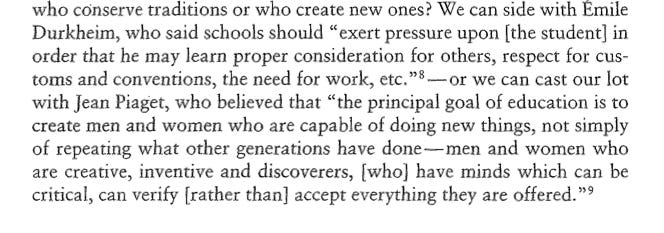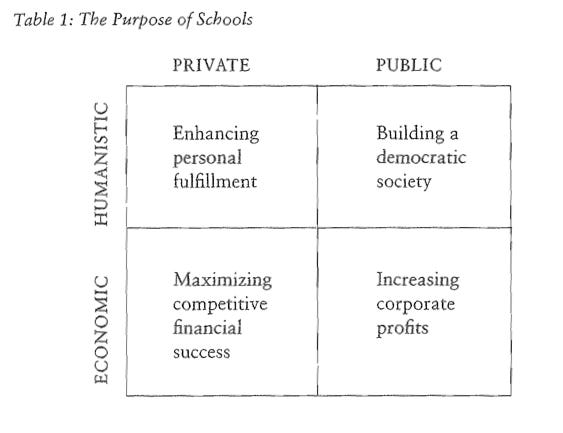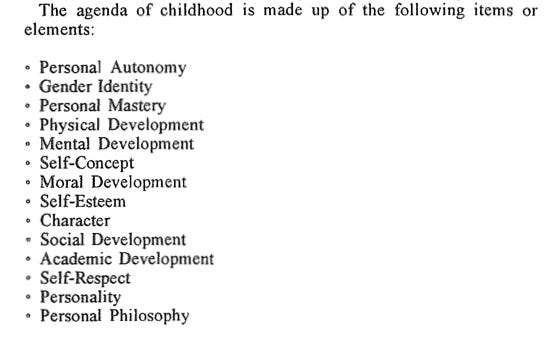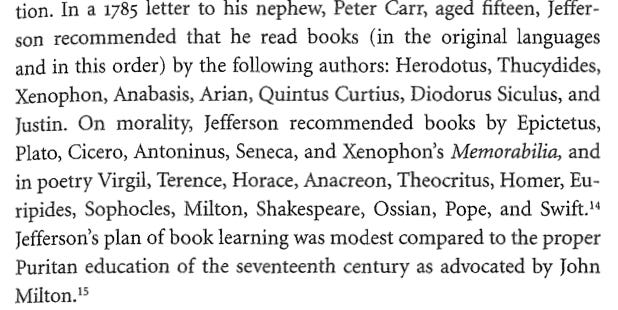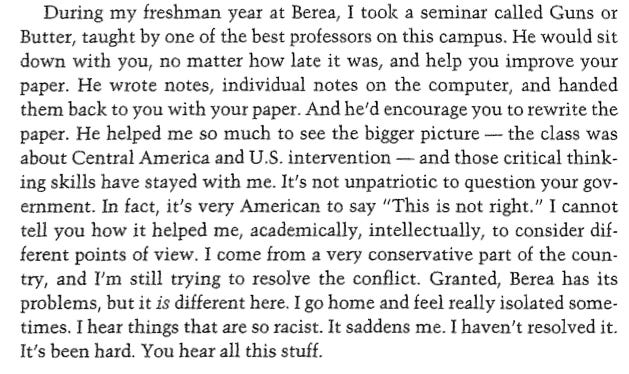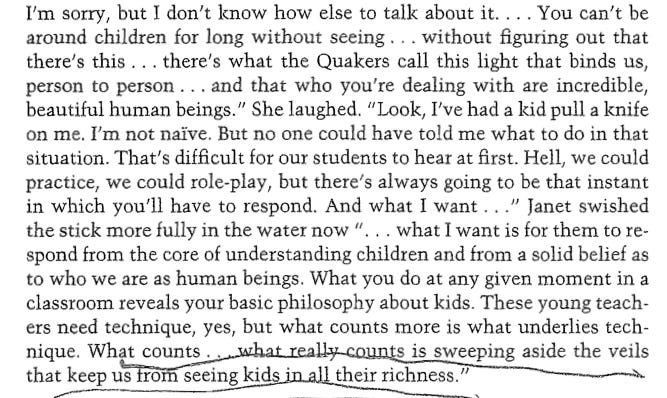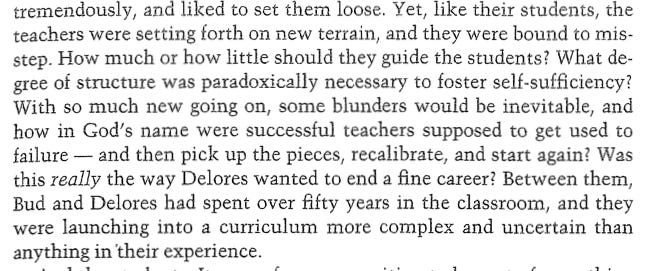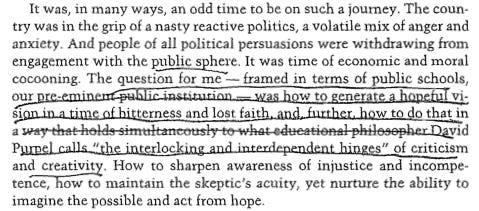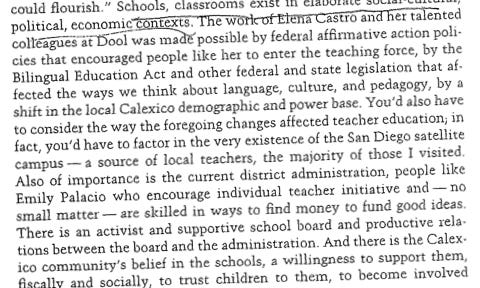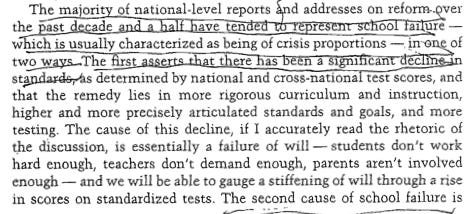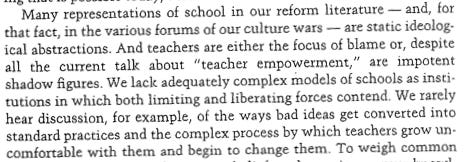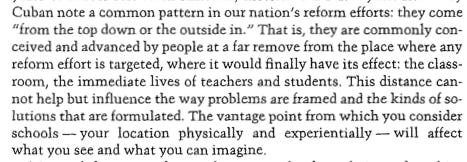Edu 9. My 1st Experiment to review a book chapter with screen shots
I am studying an overview of American education, (which I have procrastinated on for 7 years). Why should I be stingy? I’ll put it on-line as I go. If you follow along, you will be more learned.
If you are not interested, that is none of my concern. (Anyway, it took me 7 years to get to it), and I don’t guarantee I will finish it this time.
I DON’T KNOW HOW I WANT TO PRECEED? Thanks for bearing with this experiment.
I am not going to be able to write a definitive review on 50 book chapters. This is also because I cannot copy/paste, due to these are graphic files (photocopies). I can also offer the original material and you can read it yourself. But first I would have to perk your interest in some way.
Three years ago, I made an attempt to do something on another blog site. That is the material you see already on Edu 1 – Edu 8. I also did a try with taking screen shots.
That’s what I will post here, those old screen shots, to see if it is feasible to proceed in this way. These old files will be experiment one and experiment two. And then we’ll decide where to go from there.
A screen shot will most often have a sentence fragment in the beginning, and a trailing sentence at the end. THOSE ARE TO BE IGNORED.
Here are some screen shots interspersed with fragmentary writing. See how you like it: (The title is also the download link
_____________
Not only on what students learn, but strong desire to keep learning.
Sustain intellectual curiosity, and wonder
Not just transmit knowledge but to become reflective people
knows a lot of stuff or is a good thinker.
think, care, imagine, understand and adapt. autonomous learner
not only do-things but to {decide what is worth doing}.
Catechisms sought to produce believers rather than thinkers.
Conserve traditions or create new ones Education for democracy or education for profits (productive workers in a booming economy) separating the privileged from the peons, skills and work habits, get used to reward and punishment so far business interests have prevailed, education is an investment education is to raise the gross national product (and increase the value of GM stock) do the student’s interest have any say about this? Teach for a life of happiness, or is that different than a life of success? ethic of questioning rather than a preservation of the status quo
Chapter 8 - Still Alfie Kohn - education at its best, overhauling attempt to engage the transmission model
curious, creative and critical Helping children to turn out the way we hope or Doing things mostly irrelevant to our objectives And making it less likely that they’ll acquire these characteristics. By only gathering facts critical thinking must suffer because to innovate you must question “facts” Long term may be become critical thinker, but for now they must master these specific skills (pass the test) It is possible to motivate an individual??? Can you make someone do something, without making them want to do it the ‘natural’ theory of learning, (where forced motivation is counterproductive) Motivation is control, people don’t like it, it's reward and punishment Success is only a by-product of interest the heart of science is the drive to discover, not mastery of laboratory procedures student disengagement dichotomy of work and play, it’s not black and white (learning might be what’s in between). work isn’t the only activity that can be pursued rigorously respond to their questions and be deeply engaging Kids are taken seriously Humans by nature are meaning makers constructivism. They come to every situation holding a set of beliefs about the way the world works We build our new theories upon that, or have to modify them to fit with the new limitations of behaviorist mode of learning, feel safe to take challenges evidence, point of view, connections to other knowledge, relevance, constructivist premise Lilian Katz, horizontal relevance, to your life now, not only to the future. not facts to be taught or disciplines to be mastered, but questions to be answered. exaggerated individualism of the American culture Blinds the interaction that comes into understanding. pedagogical trial and error not through theoretical analysis class size and school size
plus Personal Identity Social Exchange, Fun, Excitement, and Challenge Relationship with parents
SECOND WEEK
THE KNOWLEDGE DEFICIT # 7 Hirsh
LACK OF COMMUNICATION BETWEEN GENERATIONS AND lack of trust between groups. learn to read commonality through identical early year curriculums, common body of content the setback of changing schools in mid term
About specifying content at the state level and grade level to introduce that content At least of 50% is mandated, it is known and discussed, a pure local curriculum is secret, anti content ideas, and let’s change culture, not preserve it. So much about children’s mobility and broken mid-term school changes
Hirsch Theory
formal tools for learning, more important than what is learned, Hirsch says no, no to natural learning too, both half-truths that are pernicious because they appear plausible all learning requires effort, attention and repetition, common schools, common content Reading comprehension deemed most important, wow, today? Hirsch, knowledge deficit, 2006 – 1 (link above) fewer than half reach reading proficiency philosophical romanticism, a complacent faith in the benefits of nature, school learning is natural? The way in which unnoticed metaphors unconsciously govern our thought, and words growth and development the history of ideas, knowledge-oriented teaching is vanishing good intentions in the service of inadequate ideas.
KNOWING HOW, OR KNOWING WHAT?
blame society distractions for not reading, not the way we are teaching it or reading can’t happen until social justice - demographic determinism attack the economic status quo by defending the educational status quo knowledge base of reading, create a mental situation model based on previous exposure The dominant ideas in America education are virtually unchallenged, dissent is stifled
Mike Rose Berea, 1995 Chapter 6
At upward bound I learned how to study, 3 summers of college preparatory, college atmosphere: a disadvantaged student
Interviews of student teachers. Reference to professor Fortune enthusiasm carries over. Gives a whole new perspective on things. (was her style to allow relationships with her students?)
consider the nature and motive of their own use of written language. What to say about Janet Fortune, could be a success in her class? I seem to be drawing a blank with her assignments. In some of the communities around here what men can do and what women can do is pretty much set in stone.
(This one I really liked, I think I’ll make another post on just this. below)
Mike Rose, Possible Lives 1995 chap 10
Long standing social and cultural reasons for the failure of our schools tangled disturbing histories of discrimination, skewed perception and protection of privilege.
Stop here (Whew) What do you think?
.


